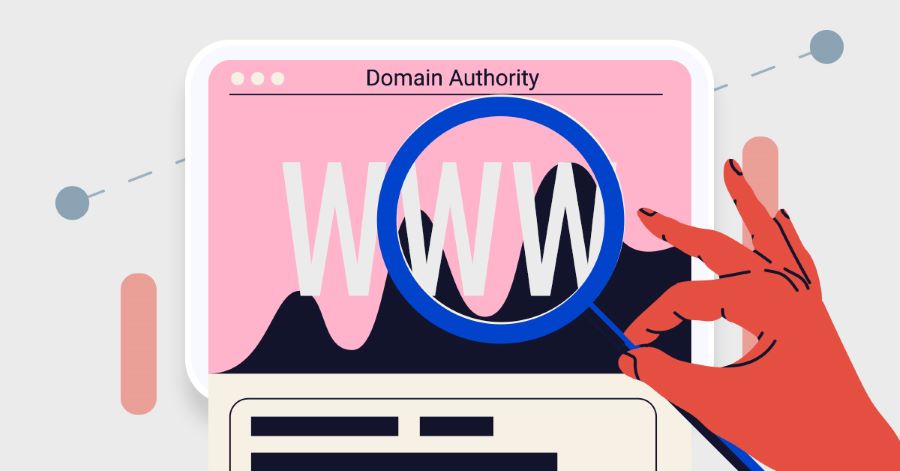What’s the Big Deal with Domain Authority?

Domain Authority (DA) is one of those SEO metrics that marketers love to talk about, and for good reason. It helps you gauge how strong your site is compared to others competing for the same keywords.
It’s worth noting, though, that Domain Authority isn’t a Google ranking factor. It’s a third-party metric developed by companies like Moz, AHRefs and SEMrush to help you estimate how well your website might perform on search engine results pages (SERPs) and is a proxy replacement to Pagerank.
Moz’s definition of Domain Authority is a score between 1 and 100 that predicts how likely a website is to rank. Sites with higher scores tend to rank better, not because Google looks at DA, but because they usually have stronger SEO fundamentals like quality backlinks, optimized content, and solid site structure.
According to Moz’s data, websites with a Domain Authority of 40 or above generally have a better chance of appearing on the first page of Google results. A strong DA also means that new content published on your site tends to gain visibility faster, since Google already trusts your domain’s reputation.
And while some may argue that DA isn’t the “end-all” metric, it’s still a useful way to benchmark your site authority, track progress, and guide strategy, especially when you’re working with an SEO service provider or building campaigns from the ground up.
What is Domain Authority?
Domain Authority (DA) is a predictive score developed by Moz that estimates how likely your website is to rank in search results. It ranges from 1 to 100, with higher scores indicating a stronger likelihood of ranking well.
The score is based on multiple factors, including the number and quality of backlinks, domain history, and overall trust signals from other sites. Moz’s algorithm uses data from billions of indexed pages to produce this metric, making it one of the most widely used indicators in the SEO industry.
Put simply, Domain Authority measures your website’s credibility in its niche. The higher your score, the more search engines perceive your site as trustworthy and authoritative.
However, DA is often confused with Page Authority (PA), a similar metric that evaluates the ranking potential of individual web pages instead of the entire domain. The two are connected: high-performing pages can help lift your overall domain authority, while weak pages can drag it down.
Think of it this way: Domain Authority reflects your website’s reputation as a whole, while Page Authority measures the strength of each individual page contributing to that reputation.
What is a Good Domain Authority Score?
“What is a good Domain Authority score?” is one of the most common questions from marketers trying to improve their SEO rankings, and the honest answer is, it depends.
The “good” range varies by industry, competition, and age of the website.
For example:
As a general guide:
Keep in mind that Domain Authority is relative, not absolute. Instead of chasing a specific number, compare your score with that of competitors in your niche. If your DA is rising faster than theirs, you’re moving in the right direction.
It’s also worth remembering that DA updates frequently, and fluctuations are normal. Check your metrics monthly to track progress and identify trends, rather than focusing on daily changes.
In short, a good Domain Authority is one that outpaces your direct competitors and continues to grow over time.
How is Domain Authority Calculated?
Domain Authority is calculated by analyzing the overall quality and diversity of your website’s backlink profile, along with other trust, engagement, and technical factors, and then combining them into a score from 1 to 100.
The higher the score, the more likely your site is to rank compared to others in the same space.
Moz’s proprietary algorithm weighs several signals when determining this score. While the exact formula is confidential, these are the most influential factors known to affect it:
1. Backlink Profile
Backlinks remain one of the most powerful signals of authority. High-quality links from relevant and reputable websites carry far more weight than links from spammy or unrelated domains.
Think of backlinks as votes of confidence: the more trustworthy websites that link to yours, the higher your site authority climbs, and the better your potential domain rankings become.
2. Relevance and Context
Links from websites related to your niche or topic signal to search engines that your content is credible and contextually valuable. Relevance matters as much as quantity.
3. Linking Root Domains
Diversity counts. Having backlinks from a wide variety of unique domains, not just one or two sources, signals broader trust and helps balance your link profile.
4. Domain Age and History
Older domains with a consistent track record of high-quality content tend to score higher. However, even newer websites can build DA quickly by focusing on strong content and ethical link-building strategies.
5. Technical and Engagement Signals
Site speed, mobile responsiveness, and consistent traffic patterns also play a role. Websites that load fast, maintain uptime, and attract genuine user engagement generally see stronger DA performance.
6. Social Media Presence
While social metrics aren’t direct ranking factors, they contribute indirectly by increasing brand visibility, generating backlinks, and boosting traffic. Consistent engagement across social media platforms can strengthen your authority footprint over time.
Moz aggregates all these elements into a single composite score. The closer you are to 100, the stronger your domain’s overall presence in search.
Tips on How to Increase Domain Authority
You can increase your Domain Authority by improving your backlink quality, optimizing technical SEO, and publishing content that earns trust and shares naturally. DA doesn’t rise overnight, but consistent, high-quality efforts pay off in stronger visibility and better organic performance.
Here’s how to build your site authority effectively:
Step 1: Build High-Quality Backlinks
Earn backlinks from reputable, industry-relevant websites. One strong, credible link is worth more than dozens of low-quality ones. Focus on shareable resources, such as data-driven blogs, expert insights, or original research, that naturally attract links and improve your SEO rankings over time.
Step 2: Strengthen Your On-Page SEO
Refine your site’s content structure, internal links, and keyword strategy. Clear, well-optimized pages help search engines understand context, and contribute directly to stronger DA performance.
Step 3: Publish Consistently High-Value Content
Keep your website active with relevant, high-quality content that provides genuine answers. Think guides, industry breakdowns, or helpful resources that others will cite. Search engines reward authority built on consistency and expertise.
Step 4: Audit and Remove Toxic Links
Not all backlinks are beneficial. Regularly check for broken or spammy links that may hurt your credibility. Tools like Moz, Ahrefs, or SEMrush can help you keep your backlink profile clean and healthy.
Step 5: Work with an SEO Service Provider
If managing SEO feels overwhelming, consider partnering with a professional SEO service provider. They can identify strategic opportunities, monitor your backlink health, and create campaigns that steadily improve your SEO rankings while protecting your brand reputation.
How Do You Check Domain Authority?
Checking your Domain Authority is simple, and it’s something every marketer should monitor regularly to measure growth and benchmark against competitors.
Here are some reliable tools to get your score:
Moz Link Explorer
As the creator of the metric, Moz’s Link Explorer is the most accurate source for your DA score. It also shows Page Authority, backlinks, and your site’s top-performing pages.
Ahrefs
Ahrefs provides a similar metric called Domain Rating (DR). While it’s not identical to Moz’s DA, it’s a reliable gauge of your backlink strength and overall site authority.
SEMrush
SEMrush assigns a Domain Score based on backlinks, organic traffic, and keyword performance. It’s particularly useful for tracking how your domain rankings shift alongside your SEO campaigns.
Small SEO Tools
A quick, free option for checking DA. While less detailed, it’s handy for quick scans or for comparing multiple sites at once.
Majestic SEO
Majestic uses two metrics: Trust Flow and Citation Flow to measure authority and quality. Together, they can help you understand your backlink credibility and domain strength.
Tip: Check your DA monthly. Since Domain Authority fluctuates based on link activity across the web, consistent tracking helps you spot upward or downward trends early.
Why Should I Care About Domain Authority?
Even though Google doesn’t use DA as a direct ranking factor, multiple studies, including those by Ahrefs and Moz, show a strong correlation between domain authority and search performance.
In short, the higher your DA, the easier it is to make ranking gains organically.
That’s because sites with strong backlink profiles, great content, and solid technical SEO already check most of the boxes Google’s algorithm values.
Here’s why DA still matters for marketers and business owners:
If your goal is to improve your SEO rankings, boosting your Domain Authority should be part of your long-term game plan. Just remember: building authority takes time.
Partner with a trusted SEO service provider who can help you create quality content, strengthen backlinks, and stay consistent across social media, all essential steps in raising your DA sustainably.










